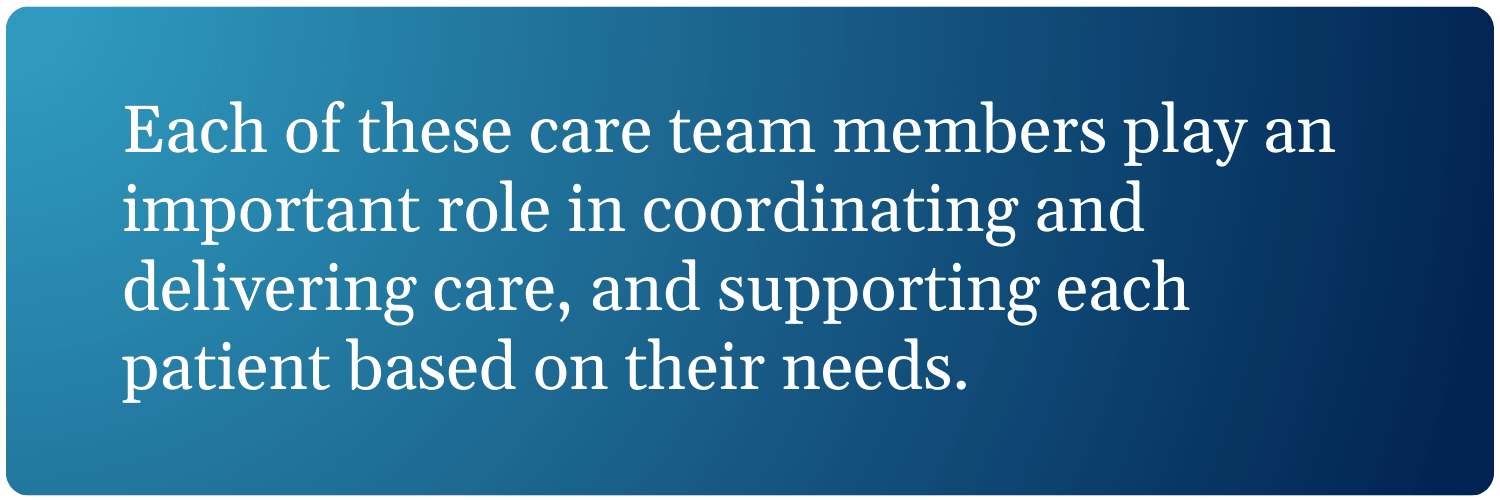What is a Clinical Care Team?

The definition of a clinical care team is:
A clinical care team for a given patient consists of the health professionals—physicians, advanced practice registered nurses, other registered nurses, physician assistants, clinical pharmacists, and other healthcare professionals—with the training and skills needed to provide high-quality, coordinated care specific to the patient’s clinical needs and circumstances.
This team-based model requires a new way of thinking about clinical responsibilities and leadership, one that recognizes that different clinicians will assume principal responsibilities for specific elements of a patient’s care as the patient’s needs change; and while the team as a whole must ensure that all elements of care are coordinated for the patient’s benefit.

Who are these Health Professionals?
Clinical care teams usually include groups of physicians, nurses, physician assistants, clinical pharmacists, social workers, and other health professionals that help to establish new lines of collaboration, communication, and cooperation to better serve their patient’s needs.
Some of these team members are doctors or technicians who will help diagnose disease; others are experts who treat diseases or care for a patient’s physical and emotional needs. These health professionals might be:
- Doctors
- Physician Assistants
- Nurses
- Pharmacists
- Dentists
- Technologists and technicians
- Therapists and rehabilitation specialists
- Emotional and social support providers
- Administrative and support staff
- Community health workers and patient navigators
Here we will give a brief introduction to these different types of health care professionals on the care team.
Doctors
Doctors, or physicians, are key members of the healthcare team. They have years of education and training. They may be primary care doctors who focus on preventive health care, or specialists who diagnose and treat conditions that require a specific area of knowledge.
Physician Assistants (PA’s)
Physician’s Assistants are licensed to practice medicine but are supervised by a doctor. They work alongside physicians to perform physical examinations, diagnose and treat illnesses, order and interpret diagnostic tests, prescribe medication, and assist in surgery.
Nurses
Nurses work closely with patients but their duties depend on their education, their area of specialty and work setting. There are three different types of nurses, Licensed Practical Nurses (LPN), Registered Nurses (RN’s), and Nurse Practitioners. Each of these differ because of their length and type of education.
Pharmacist
Pharmacists are experts in the field of medication. They work with physicians or physician assistants to ensure new prescriptions do not interact with a patient’s current medications, that the right dosage for a particular medication has been prescribed, and to answer any questions that the patient may have about their prescribed medication.
Dentist
Dentists diagnose and treat problems related to the teeth and mouth, along with giving advice and administering care to help prevent future problems. They instruct patients about the importance of brushing, flossing, fluoride, and other aspects of dental care.
Technologists/Technicians
Technologists and technicians have a more technical role in diagnosing or treating disease. Lab Technologists help providers diagnose and treat disease by analyzing body fluids and cells. Radiology Technologists help providers diagnose and treat disease by taking x-rays. Pharmacy Technicians help pharmacists prepare prescription medications but do not need any type of degree or certification.
Therapists and Rehabilitation Specialists
Therapists and rehabilitation specialists help people recover from physical changes caused by medical conditions, chronic diseases or injuries. Types of rehabilitation specialists include physical therapists, occupational therapists and speech therapists. Occupational therapists help patients perform tasks needed for every-day living or working and usually have patients who have physical, mental or developmental disabilities. Physical therapists work with patients when they have an injury, disability or medical condition that limits their ability to move or function. Respiratory therapists treat and care for patients with breathing problems like asthma or emphysema. Speech therapists work with patients who have problems related to speech, communication or swallowing. Lastly, recreation therapists provide a wide range of interventions and therapy that is designed to improve a patient’s functioning and keep them as healthy, active and independent as possible.
Emotional and Social Support
There are many healthcare team members who provide emotional and social support rather than physical support. These healthcare members are called mental health professionals, who help patients with the emotional aspect of living with a chronic disease. Psychiatrists are medical doctors who diagnose and treat mental, emotional and behavioral disorders. Psychologists deal with mental processes, especially when patients are stressed, but they are not medical doctors; instead they have a Doctor of Psychology (PsyD) or a doctor of philosophy degree (PhD).
Social workers that work in a clinical or hospital setting will help patients and families cope with the emotional, physical and financial issues related to having an illness. Depending on a patient’s needs a social worker may help coordinate services like housing, transportation, financial assistance, meals, long-term care, or hospice care.
Administrative and Clerical Staff
Administrative and clerical staff coordinate and facilitate patient care. They schedule appointments, answer phones, greet patients, keep medical records, handle medical billing, fill out insurance forms, arrange for laboratory or other diagnostic services, and handle financial records. These duties help to keep things running smoothly in a hospital or doctors office.
Community Health Workers and Patient Navigators
Community health workers link patients to primary care providers, health information, health screening, financial assistance or transportation. Patient navigators work with patients to minimize the barriers that keep them from getting healthcare. These barriers could be related to low income, transportation, childcare, language or ability to read forms or to understand the healthcare system.
Each of these care team members play an important role in coordinating and delivering care, and supporting each patient based on their needs.
Transform your Practice with Elation's Clinical-First EHR
Request a Free Demo to See How Elation's EHR Supports Your Practice.






